Eknath Vasant Chitnis | |
|---|---|
| Born | India |
| Occupation | Space scientist |
| Known for | X-ray astronomy |
| Awards | 1985 Padma Bhushan |
Eknath Vasant Chitnis is an Indian space scientist and a former member secretary at the Indian National Committee for Space Research (INCOSPAR), [1] which evolved into the present-day Indian Space Research Organisation (ISRO). [2] He is also a former director of Space Applications Centre of ISRO and a former colleague of APJ Abdul Kalam, the erstwhile president of India. [3] The Government of India awarded him the Padma Bhushan, the third highest civilian award, in 1985. [4]
It was EV Chitnis who helped Vikram Sarabhai choose location of Thumba Equatorial Rocket Launching Station, which was result of a location hunt done by Chitnis from 1961. [5] It was Chitnis who recommended induction of A. P. J. Abdul Kalam into Indian space program after getting impressed by his resume and recommendation from H.G.S. Murthy (after interview by Murthy) by selecting him for the training under NASA. [6] [7]
In 2008, EV Chitnis was unanimously selected as the Chairman of Press Trust of India. [8]

Dr. Vikram Ambalal Sarabhai was an Indian physicist and astronomer who initiated space research and helped develop nuclear power in India. He was honoured with Padma Bhushan in 1966 and the Padma Vibhushan (posthumously) in 1972. He is internationally regarded as the Father of the Indian Space Program. He was also a close friend of Homi Jehangir Bhabha.
The Vikram Sarabhai Space Centre (VSSC) is a major space research centre of the Indian Space Research Organisation (ISRO), focusing on rocket and space vehicles for India's satellite programme. It is located in Thiruvananthapuram, in the Indian state of Kerala.
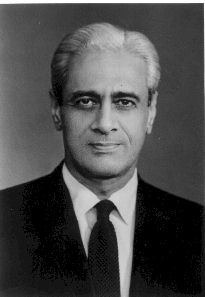
Satish Dhawan was an Indian mathematician and aerospace engineer, widely regarded as the father of experimental fluid dynamics research in India. Born in Srinagar, Dhawan was educated in India and further on in United States. Dhawan was one of the most eminent researchers in the field of turbulence and boundary layers, leading the successful and indigenous development of the Indian space programme. He succeeded M. G. K. Menon, as the third chairman of the Indian Space Research Organisation (ISRO) in 1972.
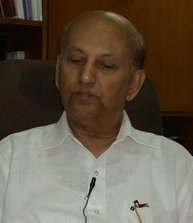
Udupi Ramachandra Rao was an Indian space scientist and former chairman of the Indian Space Research Organisation. He was also the Chairman of the Governing Council of the Physical Research Laboratory at Ahmedabad and Nehru Planetarium at Bengaluru and chancellor of the Indian Institute for Space Science and Technology (IIST) at Thiruvananthapuram. He is known as "The Satellite Man of India". He pioneered India's first satellite launch Aryabhata in 1975.
The Engineering Services Examination (ESE) is conducted by the Union Public Service Commission (UPSC) to recruit officers for the services which cater to the technical functions of the Government of India. It is a three-stage competitive examination comprising objective, subjective and personality tests.
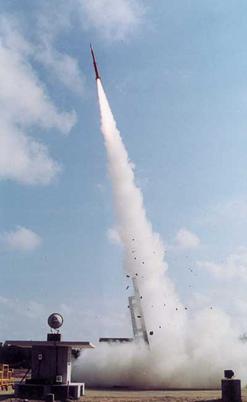
Thumba Equatorial Rocket Launching Station (TERLS) is an Indian spaceport established on 21 November 1963. Operated by the Indian Space Research Organisation (ISRO), it is located in Thumba, Thiruvananthapuram, Kerala, which is near the southern tip of mainland India, very close to earth's magnetic equator. It is currently used by ISRO for launching sounding rockets.
G. Madhavan Nair is an Indian space scientist and a former Chairman of the Indian Space Research Organisation, and Secretary to the Department of Space, Government of India. He has also been the Chairman of the Space Commission and Chairman of the Governing Body of the Antrix Corporation, Bangalore. He was Chairman of the Board of Governors of the Indian Institute of Technology Patna until he stepped down due to his involvement in a controversial deal relating to sale of radio spectrum bandwidth involving Antrix. He was subsequently barred from holding any government positions.
The Indian National Committee for Space Research (INCOSPAR) was established by India's first prime minister Pandit Jawaharlal Nehru under the Department of Atomic Energy (DAE) in 1962, on the urging of scientist Vikram Sarabhai, recognising the need in space research. It committed to formulate the Indian Space Programme. At the time, the committee was part of the Tata Institute of Fundamental Research. The committee took over the responsibilities of the Department of Atomic Energy in space science and research. The then director of the DAE, Dr. Homi Bhabha, was instrumental in creation of the committee.
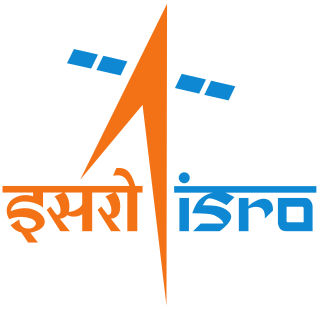
The Chairman of the Indian Space Research Organisation is the statutory head of the Indian Space Research Organisation (ISRO). The officeholder is a secretary to the government of India and an executive of the Department of Space (DOS) which directly reports to the prime minister of India.

Koppillil Radhakrishnan is an Indian space scientist who headed the Indian Space Research Organisation (ISRO) between November 2009 and December 2014 as Chairman of Space Commission, Secretary of the Department of Space and Chairman of ISRO. Prior to this, he was the Director of Vikram Sarabhai Space Centre (2007-2009) and Director of National Remote Sensing Agency (2005-2008) of the Department of Space. He had a brief stint of five years (2000-2005) in the Ministry of Earth Sciences as Director of Indian National Centre for Ocean Information Services (INCOIS).
Parivakkam Subramaniam Veeraraghavan is a well known space scientist and rocket technologist of India. He has served as the Director of Vikram Sarabhai Space Centre (VSSC), Thiruvananthapuram, Kerala and as the Director of ISRO Inertial Systems Unit (IISU), Thiruvananthapuram. One of the most senior scientists at Indian Space Research Organization (ISRO), Veeraraghavan is known for his contributions to launch vehicle technology, especially in the areas of integration & checkout and Inertial Systems of ISROs launch vehicles. Presently, he is holding the honorary position of Prof. Vikram Sarabhai Distinguished Professor in VSSC, ISRO since January 2013.
A Sivathanu Pillai is an Indian scientist who formerly served as Honorary Distinguished Professor at Indian Space Research Organisation (2015-2018) and an honorary professor at IIT Delhi in the Department of Mechanical Engineering (2015-2016) and a Visiting Professor at Indian Institute of Science (2014-2015).
Vipparthi Adimurthy is the ISRO Honorary Distinguished Professor, VSSC. He was the former Satish Dhawan Professor and Dean of Research at the Indian Institute of Space Science and Technology (IIST). Prior to joining IIST, Adimurthy held the post of associate director at the Vikram Sarabhai Space Centre, a major facility center of Indian Space Research Organisation (ISRO). He is known for his contributions to the rocket technology and space dynamics. He is a recipient of Padma Shri from the Government of India. Murthy is the Mission Concept Designer, for India's Mars Orbiter Mission.
Brahm Prakash, was a metallurgist known for his work with nuclear materials in India.

M. C. Dathan is an Indian space scientist and former director of the Vikram Sarabhai Space Centre (VSSC). The Government of India honoured him, in 2014, by awarding him the Padma Shri, the fourth highest civilian award, for his contributions to the fields of science and technology. In May 2016, the Government of Kerala appointed MC Dathan as the scientific advisor to chief minister.
Nilamber Pant is an Indian space scientist, a former member of the Space Commission of India and a pioneer of satellite based communication and broadcasting in India. He served at the Satish Dhawan Space Centre and the ISRO Satellite Centre before becoming the vice chairman of the Indian Space Research Organization (ISRO). The Government of India awarded him the fourth highest Indian civilian honour of Padma Shri in 1984.
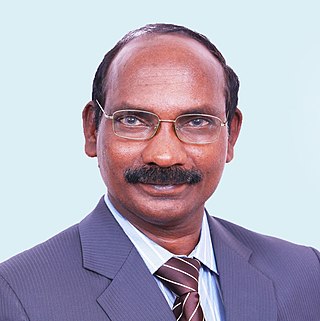
Kailasavadivoo Sivan is an Indian space scientist who served as the Secretary of the Department of Space and chairman of Indian Space Research Organisation and Space Commission. He has previously served as the Director of the Vikram Sarabhai Space Center and the Liquid Propulsion Systems Centre.
Madhavan Pillai Ramakrishna Kurup was an Indian rocket scientist and the founder of the first solid rocket propellant plant in India at the Vikram Sarabhai Space Centre. He is known to have contributed to the successful launching of the Augmented Satellite Launch Vehicle (ASLV) as the director of the VSSC centre in Thiruvananthapuram. The Government of India awarded him the fourth highest civilian award of Padma Shri in 1990.
Suryanarayanan Srinivasan (1941–1999) was an Indian aeronautical engineer and the Director of the Vikram Sarabhai Space Centre (VSSC), known for his pioneering work in rocket science. He also served as the director of Satish Dhawan Space Centre and assisted A. P. J. Abdul Kalam in the SLV3 Mission as its deputy director. He was an elected Fellow of the Aeronautical Society of India and the Indian National Academy of Engineering. The Government of India awarded him the third highest civilian honour of the Padma Bhushan, in 2000, for his contributions to Indian space program.
Holenarasipuram Govindrao Srinivasa Murthy was an IOFS officer and a space scientist. He was known as one of the "Seven Pioneers of the Indian Space Programme".<He served at the Machine Tool Prototype Factory (MTPF), Ambernath, and as the first Director of the Thumba Equatorial Rocket Launching Station (TERLS), and the Space Science & Technology Centre, now known as the Vikram Sarabhai Space Centre, of the Indian Space Research Organisation (ISRO). He was awarded Padma Shri in 1969 by the Government of India. He interviewed and recruited A. P. J. Abdul Kalam into ISRO.